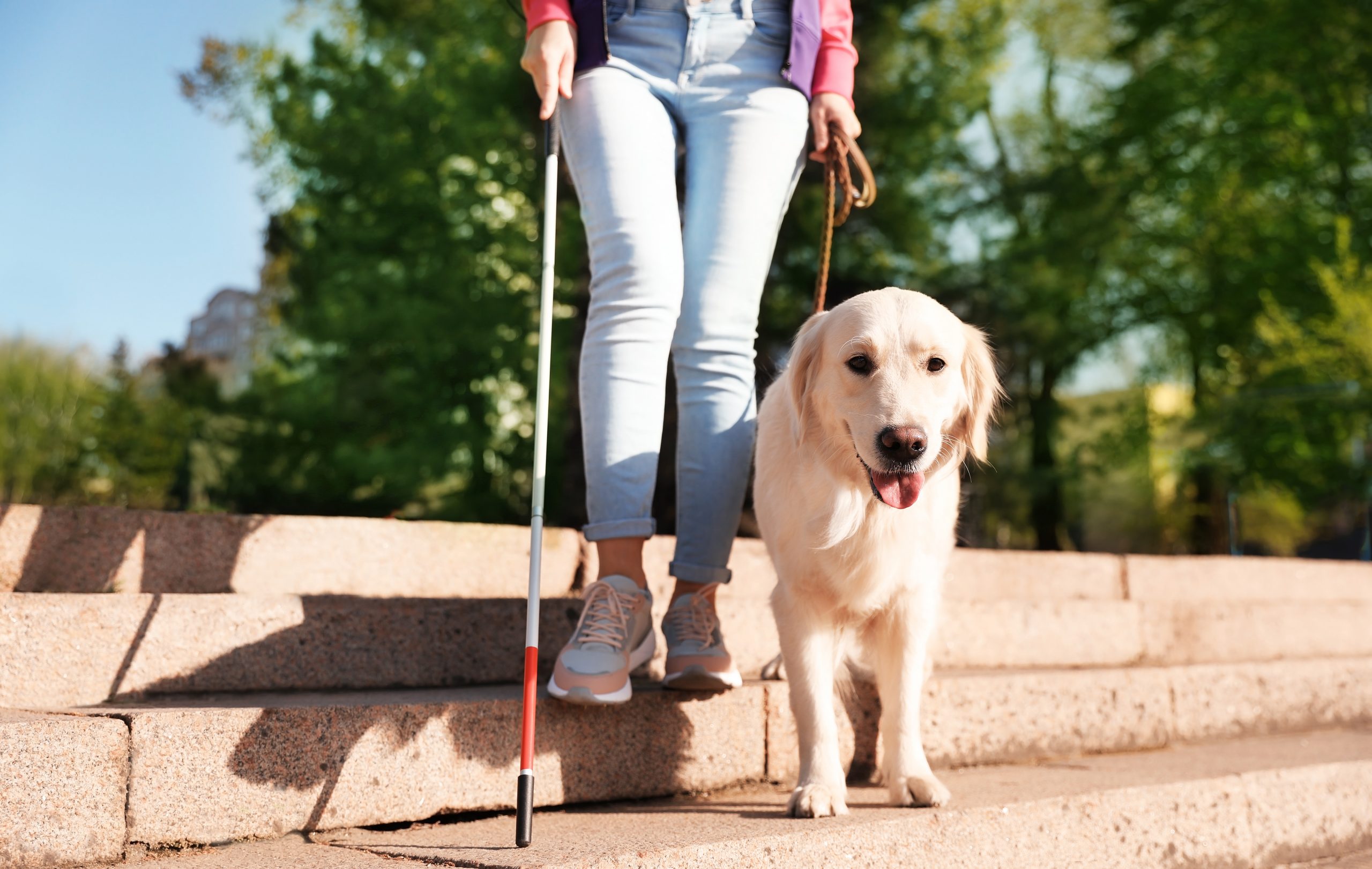
In Australia, various measures are in place to ensure that people with assistance animals have equal access to public spaces and services. Under the Disability Discrimination Act 1992 (DDA), it is unlawful to refuse access to premises, facilities, goods or services simply because an assistance animal accompanies them.
Unfortunately, there continue to be many instances where people with assistance animals are asked to leave premises, such as a cafe, or are refused access to specific public spaces.
So, what steps can be taken to ensure equal access for people with assistance animals?
Making people more aware of the law
To ensure everyone knows what they can and can’t do, the NSW Office of Local Government provides information about assistance animals in different situations according to the law. With more information and education, we can help organisations understand their responsibilities concerning ensuring equal access for people with disabilities who use an assistance animal.
However, there are ongoing issues that people with assistance animals face daily. These include:
- Difficulty finding rental accommodation for their animal
- Poor understanding of the law regarding assistance animals
- Lack of public spaces specifically designed to accommodate assistance animals
- Unnecessary questioning or discrimination when using public services
Understand that assistance is not just for the blind and visually impaired
Apart from guide dogs, there are a variety of other assistance animals that provide valuable support to people with disabilities.
- Hearing or signal dogs include hearing or signal dogs trained to alert their handler to important sounds, such as doorbells, alarm clocks and smoke alarms.
- Service animals include psychiatric service dogs, which people with physical or mental health issues also use. These dogs can be trained to help their handlers in many ways, including providing emotional support during anxiety attacks, helping them manage daily tasks such as shopping and household chores or guiding them away from dangerous situations.
- Assistance animals include therapy dogs, which are increasingly used for therapeutic purposes in hospitals and care facilities. There are also emotional support animals that are used to provide comfort and companionship for those suffering from emotional distress, such as depression and anxiety. These animals require a different level of training, but their presence can be highly beneficial for those in need.
Don’t presume or assume: Understanding Invisible disabilities
It’s important to remember that some people have an ‘invisible’ disability, which means you can’t just judge based on visual cues.
‘Invisible’ disabilities, including mobility and mental health issues, are disabilities that aren’t immediately apparent. They often go unnoticed or unrecognised yet can be just as debilitating as ‘visible’ disabilities. We must foster greater inclusion when it comes to ‘invisible’ disabilities, recognising their presence and accounting for the unique needs of those with ‘invisible’ disabilities.
Accessibility and understanding are vital in creating an inclusive world for all people regardless of ‘invisible’ disability or impairment. So, it’s best always to ask and be kind and understanding when speaking to someone with an assistance animal – they have a right to move freely and openly in all places, even where dogs are not allowed.
The statistics tell the story:
- 53% of Guide Dog users experience discrimination
- 40% of discrimination occurs in cafes and restaurants
- 41% of those discriminated against said they had changed their routine and avoided certain places as a result
- 21% of Guide Dog users experience discrimination in taxis
Assistance animals and the Disability Discrimination Act 1992 (Cth)
The Disability Discrimination Act 1992 (Cth) (DDA) in Section 9, sets out the legal definition of an assistance animal as a dog or other animal that:
(a) is accredited under a State or Territory law to assist a person with a disability to alleviate the effects of disability; or
(b) is accredited by an animal training organisation prescribed in the regulations; or
(c) is trained to assist a person with a disability to alleviate the effect of the disability and meets standards of hygiene and behaviour that are appropriate for an animal in a public place.
Tips for businesses improving accessibility for people with assistance animals
Ensuring businesses are accessible to those with ‘invisible’ disabilities, including those who require an assistance animal, is an essential part of creating an inclusive environment. Measures include:
- Ensure that staff are educated about the law relating to assistance animals.
- Provide accessible spaces and areas specifically designed for people with assistance animals.
- Offer reasonable adjustments to services or facilities when necessary.
- Respond promptly to any complaints regarding discrimination.
- Be aware that a guide dog is only one type of assistance animal, and other types help with hearing disabilities and medical conditions.
- If you are unsure, ask the person to provide some evidence before asking them to leave the animal outside.
How the government is helping
Fortunately, the NSW State Government and other organisations are working hard to address these issues. There is now a greater focus on education around the law relating to assistance animals, and businesses are encouraged to provide appropriate facilities for them. Additionally, some organisations offer assistance with housing searches tailored explicitly towards people with assistance animals.
There are various regulatory schemes governing assistance animals in NSW:
- AWARE Dogs Australia
- Guide Dogs Australia
- Australian Support Dogs (ASDOG)
- mindDog
- Assistance Dogs Australia
- Deafblind Information
In conclusion, Australia is notably progressive regarding the rights and wellbeing of persons with assistance animals, due primarily to tenets of the Disability Discrimination Act 1992 (DDA). All individuals should know the DDA implications for access and opportunities for those with assistance animals. Organisations, too, should be mindful of their potential legal liabilities when denying access to people with assistance animals. Understanding can effectively ensure equal access for everyone, regardless of ability.
If you have any questions or need guidance around making your premises disability friendly, don’t hesitate to get in touch with us here at Access Link Consulting; we are passionate about promoting accessibility for all! Call us on (02) 8319 4616 to enquire about our services today.









